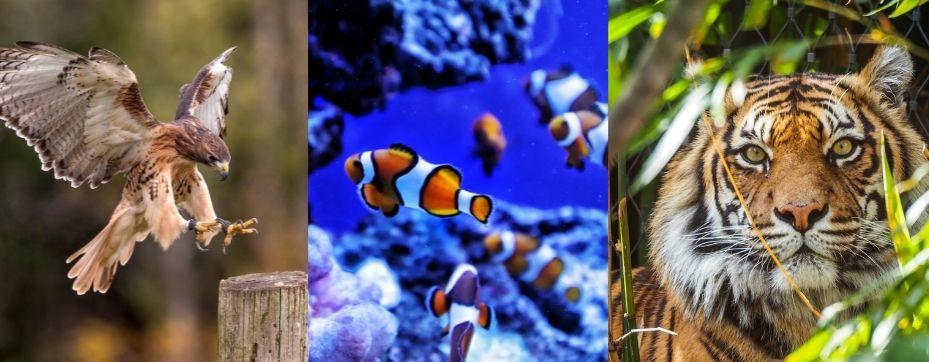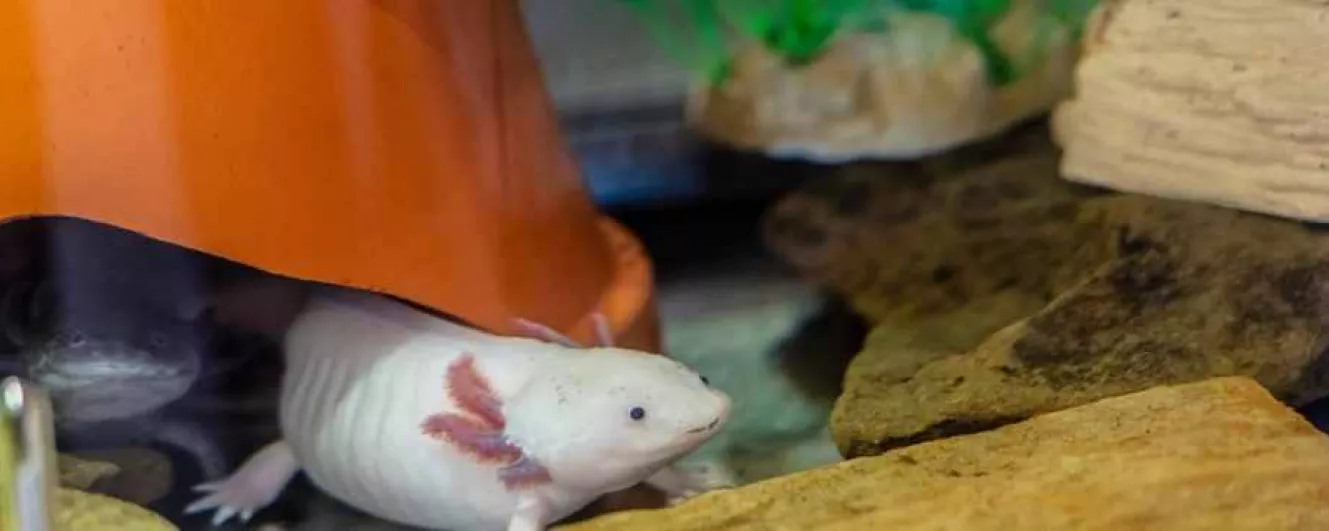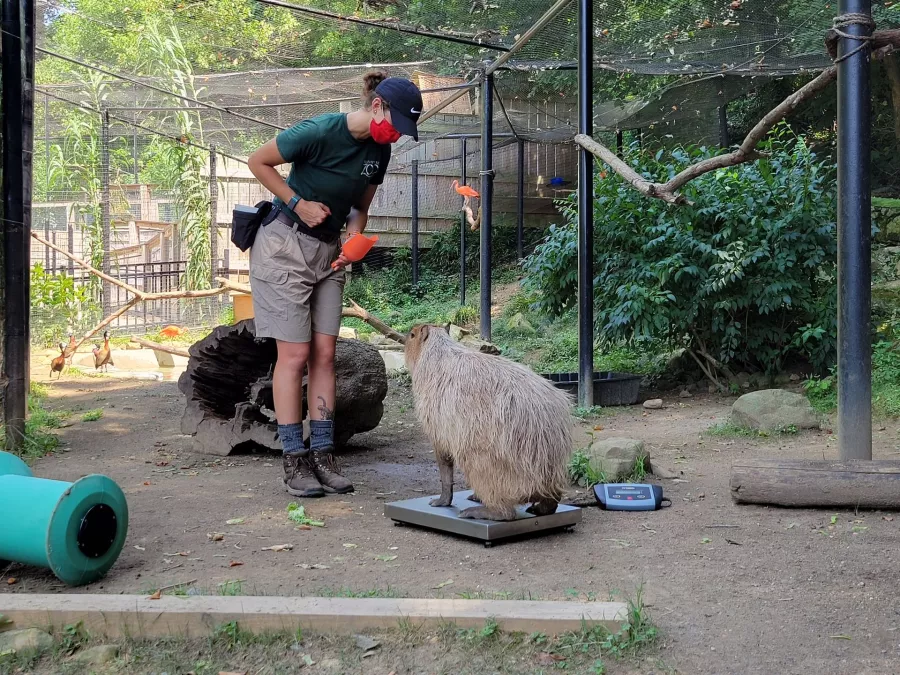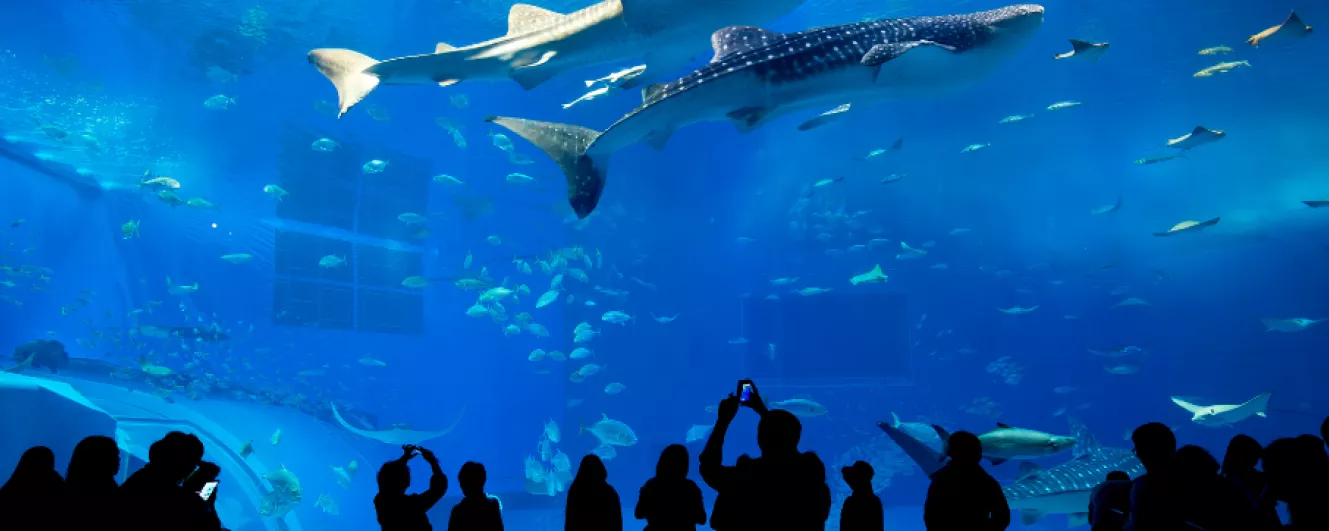
SCHOOL OF STEAM
Aquarium & Zoo Science, Bachelor of Arts
Introduction
Aquarium & Zoo Science Degree from Saint Francis University
Turn your passion for animals into a fulfilling career.
The Aquarium and Zoo Science major is a B.A. degree program with a heavy emphasis on biology, animal husbandry, and psychology. Hands-on coursework includes animal care, animal nutrition, vertebrate zoology, invertebrate zoology, microbiology, genetics, and marine biology.
In this program, you will gain practical experience geared to what employers in this industry need.
-
hands-on courses with animal care projects on and off-campus
-
dedicated animal care practicum experience and a tailored internship
-
career-enhancing student clubs that align with your goals
Offered: On-Campus
hands-on experience with animals on-campus and at local wildlife facilities
1,500-gallon aquarium on-campus large enough to hold a diver
animal care practicum and hands-on internship built into program

Tailored for Employers' Needs
Our Aquarium and Zoo Science program is one of the only degree programs in the region specifically designed to match the workforce expectations of employers overseeing aquariums and zoos.
- Do you want to work behind the scenes caring for animals or training them?
- Do you want to educate visitors about biodiversity, conservation, and natural history?
- Do you want to work in a zoo or aquarium and want a degree tailored to that goal?
If the answer is yes, the Aquarium and Zoo Science, B.A. could be the degree path for you!
Hands-on Experience
Our 1,500-gallon aquarium is large enough for a single diver to enter, and students are involved in the operation of the large-scale filtration system needed to maintain it. Access to materials in the on-campus marine lab allows students to do discipline-specific research.
Practicum & Internships
A 52-hour Animal Care Practicum working in an animal care facility prepares students for their main internship where they find a facility of interest to spend a 240-hour internship, usually over summer break. These experiences build students' repertoire of animal care and husbandry skills while enhancing employment prospects through the connections they make.
Professional Affiliations
- Saint Francis University is the official Conservation Partner of the Association of Zoos and Aquariums (AZA)
- Saint Francis University is an Academic Support Organization for the Association of Minority Zoo & Aquarium Professionals (AMZAP)
Clubs & Honor Society Involvement
SCUBA: Students learn to scuba dive or continue to build diving skills while exploring the fascinating underwater world (invaluable experience for those pursuing employment in aquariums after graduation).
Environmental Action Society: This organization promotes environmental education and outreach to the students, faculty, and staff of Saint Francis University as well as to the community at large. Members also have fun in the environment while preserving it!
Biology Club: This club is designed to help students prepare for their future in the sciences as well as to offer opportunities to participate in fellowship and networking activities.
TriBeta Biological Honor Society: Saint Francis is home to the Upsilon Beta Chapter of Beta Beta Beta, the National Biological Honor Society. Numerous student members have received research scholarship grants from the TriBeta national office and presented their research at the District Convention.
The best way to explore what the student experience really looks like is to schedule a visit
We would love to meet you and discuss your career goals!

The SFU LEARNING EXPERIENCE
Aquarium & Zoo Science the Saint Francis Way
As you progress through our curriculum, you will not only learn how to provide care to animals but also develop a strong foundation in Franciscan ethics and values.
As an Aquarium and Zoo Science major, you will gain practical experience geared to what employers in this industry need.
- hands-on courses with animal care projects on and off-campus
- an official animal care practicum experience and a tailored internship
- career-enhancing student clubs that align with your goals
CURRICULUM & COURSES
What You’ll Learn in the Aquarium & Zoo Science Program
The students will complete a broad survey of biology the first year and then build upon this by completing courses in animal care, animal nutrition, vertebrate zoology, invertebrate zoology, microbiology, genetics, and marine biology. Skills will be developed by students while completing their animal care practicum and internships along with laboratory exercises. Students will have the opportunity to develop presentation skills both in front of and inside a large aquarium, presenting information to school children and visitors to the biology department.
Degree Path:
Aquarium and Zoo Science, B.A.
Related Programs:
The following objectives are tracked as success metrics in the program:
- Job Placement of Recent Graduates
- Benchmark Met: 13 of 14 (93% ) of students in the previous two graduating classes (2019 & 2020) secured a career-relevant position or an internship following graduation, based on our most recent records (6/10/2021).
- Internship Evaluations
- Benchmark Met: All evaluations received from the 2020-2021 year met or exceeded expectations.
- Student Portfolio (cumulative course projects, animal care practicum supervisor evaluation, and internship presentation)
- Benchmark Met: 2021 graduates completed their portfolios with the required elements.

Dedicated Researchers; Passionate Teachers
Our aquarium and zoo sciences faculty prioritize student learning above all other commitments and can provide individualized attention due to small class sizes.
Dr. Justin Merry
Department Chair, Biology
814-471-1105
Email: jmerry@francis.edu
Career Outlook in Aquarium and Zoo Science
Career opportunities exist within nature centers, wildlife rehabilitation centers, aquariums, and zoos. Students can also seek employment with whale watch groups and other types of non-profit activities where animal knowledge and presentation abilities are valued.
Animal care and service workers are in high demand. The Occupational Outlook Handbook (from the Bureau of Labor Statistics) projects that demand for these jobs will grow by 34% from 2020-2030, much faster than average for all occupations. About 66,200 openings for animal care and service workers are projected each year, on average, over the decade.
Animal Caretakers
The median annual wage for animal caretakers was $26,080 in May 2020. The median wage is the wage at which half the workers in an occupation earned more than that amount and half earned less. The lowest 10 percent earned less than $19,310, and the highest 10 percent earned more than $40,210.
Animal Trainers
The median annual wage for animal trainers was $31,520 in May 2020. The lowest 10 percent earned less than $21,550, and the highest 10 percent earned more than $62,040.
FAQs
Frequently Asked Questions About Aquarium & Zoo Science
-
Career opportunities exist at nature centers and wildlife rehabilitation centers along with the many aquarium and zoos. Students can also seek employment with whale watch groups and other types of activities where animal knowledge and presentation abilities are utilized.
-
In your very first year, we provide you with a faculty mentor. As you progress through the curriculum, you will learn how to care for and monitor wildlife and develop a strong foundation in Franciscan ethics and values.
-
Our program emphasizes practical experience through hands-on courses, undergraduate research alongside faculty, animal care practicum experience, and internships.
First-year students are encouraged to get involved in undergraduate research during their spring semester. Many pursue internships or research opportunities each summer throughout their four years at SFU.
-
Over the last five years, our students have held internships at the following sites:
• Asbury Woods Nature Center, Erie, PA
• Back to the Wild, Inc., Castalia, OH
• Bronx Zoo, NY
• Cleveland Zoo, OH
• Duke Lemur center, Durham, NC
• Elmwood Park Zoo, Norristown, PA
• Georgia Aquarium, Atlanta, GA
• Glen Echo Park Aquarium, Glen Echo, MD
• Herps Alive Foundation, South Euclid, OH
• Karen Beasley Sea Turtle Rescue & Rehabilitation Center, Surf City, NC
• Jacksonville Zoo, FL
• Lake Superior Zoo, Duluth, MN
• Lehigh Valley Zoo, Schnecksville, PA
• Maine Wildlife Park, Gray, ME
• National Aviary, Pittsburgh, PA
• Nemacolin Woodlands Resort, Farmington, PA
• New York Aquarium, Brooklyn, NY
• North Carolina Zoo, Asheboro, NC
• North Georgia Zoo & Farm, Cleveland, GA
• Plumpton Park Zoo, Rising Sun, MD
• Possumwood Acres Wildlife Sanctuary, Hubert, NC
• Roer’s Zoofari, Vienna, VA
• Shaver’s Creek Penn State Nature Center, Petersburg, PA
• Six Flags Great Adventure, Jackson, NJ
• Staten Island Zoo, NY
• Pittsburgh Zoo & PPG Aquarium, PA
• Popcorn Park Zoo, Forked River, NJ
• T&D Cats of the World, Penn’s Creek, PA
• Walt Disney World, Orlando, FL
• Zoo Tampa at Lowry Park, FL
Career opportunities exist at nature centers and wildlife rehabilitation centers along with the many aquarium and zoos. Students can also seek employment with whale watch groups and other types of activities where animal knowledge and presentation abilities are utilized.
In your very first year, we provide you with a faculty mentor. As you progress through the curriculum, you will learn how to care for and monitor wildlife and develop a strong foundation in Franciscan ethics and values.
Our program emphasizes practical experience through hands-on courses, undergraduate research alongside faculty, animal care practicum experience, and internships.
First-year students are encouraged to get involved in undergraduate research during their spring semester. Many pursue internships or research opportunities each summer throughout their four years at SFU.
Over the last five years, our students have held internships at the following sites:
• Asbury Woods Nature Center, Erie, PA
• Back to the Wild, Inc., Castalia, OH
• Bronx Zoo, NY
• Cleveland Zoo, OH
• Duke Lemur center, Durham, NC
• Elmwood Park Zoo, Norristown, PA
• Georgia Aquarium, Atlanta, GA
• Glen Echo Park Aquarium, Glen Echo, MD
• Herps Alive Foundation, South Euclid, OH
• Karen Beasley Sea Turtle Rescue & Rehabilitation Center, Surf City, NC
• Jacksonville Zoo, FL
• Lake Superior Zoo, Duluth, MN
• Lehigh Valley Zoo, Schnecksville, PA
• Maine Wildlife Park, Gray, ME
• National Aviary, Pittsburgh, PA
• Nemacolin Woodlands Resort, Farmington, PA
• New York Aquarium, Brooklyn, NY
• North Carolina Zoo, Asheboro, NC
• North Georgia Zoo & Farm, Cleveland, GA
• Plumpton Park Zoo, Rising Sun, MD
• Possumwood Acres Wildlife Sanctuary, Hubert, NC
• Roer’s Zoofari, Vienna, VA
• Shaver’s Creek Penn State Nature Center, Petersburg, PA
• Six Flags Great Adventure, Jackson, NJ
• Staten Island Zoo, NY
• Pittsburgh Zoo & PPG Aquarium, PA
• Popcorn Park Zoo, Forked River, NJ
• T&D Cats of the World, Penn’s Creek, PA
• Walt Disney World, Orlando, FL
• Zoo Tampa at Lowry Park, FL